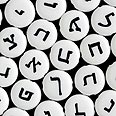Hebrew as a foreign language? More than six decades after the establishment of the State of Israel
and more than a century after the revival of the Hebrew language as a spoken vernacular, data indicate that the language is not as culturally solid in Israel as one might expect. According to information released Monday by the Central Bureau of Statistics,
Hebrew is the native tongue of only 49% of Israelis over the age of 20.
The mother tongues of the rest of the 20-somethings in Israel divide between Arabic (18%), Russian (15%), Yiddish (2%), French (2%) and English (2%). Other languages account for the remaining 1.6%.
Related stories:
- Theses in English 'erosion of Hebrew'
- Keeping Hebrew Israel's living language
- Yiddish becomes hit among Israeli Arabs
According to the data, the majority of Israeli Jews are proficient in Hebrew; 90% of the Jewish public is considered proficient in Hebrew, and 70% is regarded highly proficient.
As for Israel's Arab population, the CBS found that 60% are proficient or very proficient in Hebrew; 17% do not read Hebrew at all and 12% do not speak it.
Another sector examined by the report was Russian immigrants, of whom 51% possess a good or very good level of spoken Hebrew, whereas 26% barely speak it or do not speak it at all. Some 39% do not read Hebrew or possess poor Hebrew literacy.
Among immigrants of the former USSR, 48% speak only Russian at home, 6% speak only Russian at work and 38% speak only Russian with friends. As for the exclusivity of Hebrew among Russian immigrants, 8% speak only Hebrew at home, 32% speak only Hebrew at work and 9% speak only Hebrew with friends. The rest engage in some amalgamation of Hebrew and Russian.
The effect of unfamiliarity with Hebrew is mainly manifested in facing bureaucratic systems, including filling out forms, reading formal letters from authorities, or writing letters of administrative nature. 27% of Israelis over the age of 20 said they found tasks pertaining to filling out forms or writing formal letters to be straining. As for Israelis over the age of 65, such tasks were reportedly exerting to 53%.
According to the CBS, the figures were based on the personal assessment of those questioned in regards to their level of Hebrew. Those surveyed were asked for their opinion on their own knowledge of Hebrew, and were asked to rate their proficiency in Hebrew writing, reading, comprehension and speaking.
- Receive Ynetnews updates
directly to your desktop

Hebrew
Photo: Shutterstock
מומלצים















